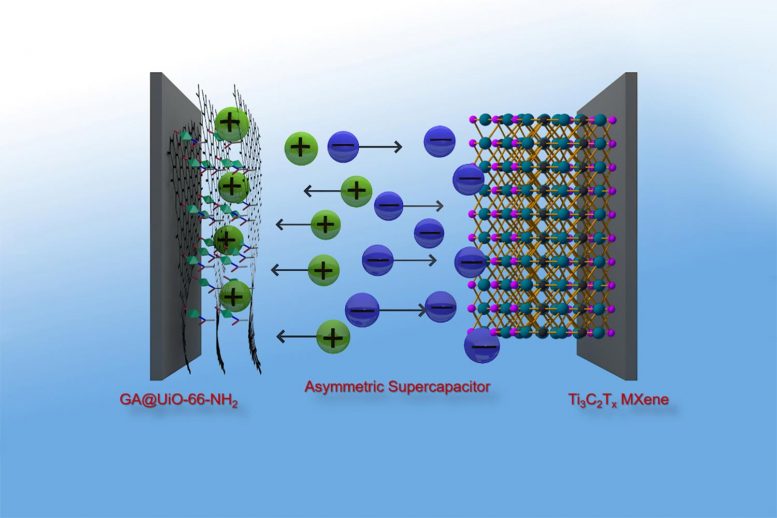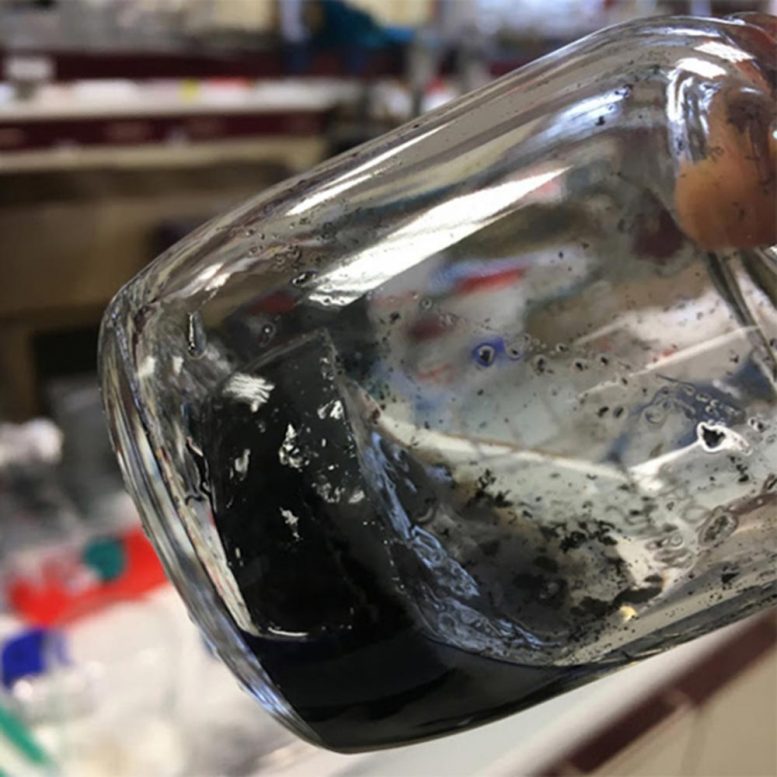
Posted on 01/07/2021 8:03:34 AM PST by Red Badger

Graphene hybrid made from metal organic frameworks (MOF) and graphenic acid make an excellent positive electrode for supercapacitors, which thus achieve an energy density similar to that of nickel-metal hydride batteries. Credit: Prof. Dr. J. Kolleboyina / IITJ
====================================================================
A team working with Roland Fischer, Professor of Inorganic and Metal-Organic Chemistry at the Technical University Munich (TUM) has developed a highly efficient supercapacitor. The basis of the energy storage device is a novel, powerful and also sustainable graphene hybrid material that has comparable performance data to currently utilized batteries.
Usually, energy storage is associated with batteries and accumulators that provide energy for electronic devices. However, in laptops, cameras, cellphones or vehicles, so-called supercapacitors are increasingly installed these days.
Unlike batteries they can quickly store large amounts of energy and put it out just as fast. If, for instance, a train brakes when entering the station, supercapacitors are storing the energy and provide it again when the train needs a lot of energy very quickly while starting up.
However, one problem with supercapacitors to date was their lack of energy density. While lithium accumulators reach an energy density of up to 265 Kilowatt hours (KW/h), supercapacitors thus far have only been delivering a tenth thereof. Sustainable material provides high performance
The team working with TUM chemist Roland Fischer has now developed a novel, powerful as well as sustainable graphene hybrid material for supercapacitors. It serves as the positive electrode in the energy storage device. The researchers are combining it with a proven negative electrode based on titan and carbon.

Graphene hybrids made from metal organic frameworks (MOF) and graphenic acid make an excellent positive electrode for supercapacitors, which thus achieve an energy density similar to that of nickel-metal hydride batteries. The black color indicates high electron mobility within the material. Credit: Prof. Dr. J. Kolleboyina / IITJ
===============================================================
The new energy storage device does not only attain an energy density of up to 73 Wh/kg, which is roughly equivalent to the energy density of a nickel metal hydride battery, but also performs much better than most other supercapacitors at a power density of 16 kW/kg. The secret of the new supercapacitor is the combination of different materials – hence, chemists refer to the supercapacitor as “asymmetrical.” Hybrid materials: Nature is the role model
The researchers are betting on a new strategy to overcome the performance limits of standard materials – they utilize hybrid materials. “Nature is full of highly complex, evolutionarily optimized hybrid materials – bones and teeth are examples. Their mechanical properties, such as hardness and elasticity were optimized through the combination of various materials by nature,” says Roland Fischer.
The abstract idea of combining basic materials was transferred to supercapacitors by the research team. As a basis, they used the novel positive electrode of the storage unit with chemically modified graphene and combined it with a nano-structured metal organic framework, a so-called MOF. Powerful and stable
Decisive for the performance of graphene hybrids are on the one hand a large specific surface and controllable pore sizes and on the other hand a high electrical conductivity. “The high performance capabilities of the material is based on the combination of the microporous MOFs with the conductive graphene acid,” explains first author Jayaramulu Kolleboyina, a former guest scientist working with Roland Fischer.
A large surface is important for good supercapacitors. It allows for the collection of a respectively large number of charge carriers within the material – this is the basic principle for the storage of electrical energy.
Through skillful material design, the researchers achieved the feat of linking the graphene acid with the MOFs. The resulting hybrid MOFs have a very large inner surface of up to 900 square meters per gram and are highly performant as positive electrodes in a supercapacitor. Long stability
However, that is not the only advantage of the new material. To achieve a chemically stable hybrid, one needs strong chemical bonds between the components. The bonds are apparently the same as those between amino acids in proteins, according to Fischer: “In fact, we have connected the graphene acid with a MOF-amino acid, which creates a type of peptide bond.”
The stable connection between the nano-structured components has huge advantages in terms of long term stability: The more stable the bonds, the more charging and discharging cycles are possible without significant performance impairment.
For comparison: A classic lithium accumulator has a useful life of around 5,000 cycles. The new cell developed by the TUM researchers retains close to 90 percent capacity even after 10,000 cycles. International network of experts
Fischer emphasizes how important the unfettered international cooperation the researchers controlled themselves was when it came to the development of the new supercapacitor. Accordingly, Jayaramulu Kolleboyina built the team. He was a guest scientist from India invited by the Alexander von Humboldt Foundation and who by now is the head of the chemistry department at the newly established Indian Institute of Technology in Jammu.
“Our team also networked with electro-chemistry and battery research experts in Barcelona as well as graphene derivate experts from the Czech Republic,” reports Fischer. “Furthermore, we have integrated partners from the USA and Australia. This wonderful, international co-operation promises much for the future.”
Reference: “Covalent Graphene‐MOF Hybrids for High‐Performance Asymmetric Supercapacitors” by Kolleboyina Jayaramulu, Michael Horn, Andreas Schneemann, Haneesh Saini, Aristides Bakandritsos, Vaclav Ranc, Martin Petr, Vitalie Stavila, Chandrabhas Narayana, Błażej Scheibe, Štěpán Kment, Michal Otyepka, Nunzio Motta, Deepak Dubal, Radek Zbořil and Roland A. Fischer, 4 December 2020, Advanced Materials. DOI: 10.1002/adma.202004560
Have they solved the explosion problem?
A minor inconvenience...................
This interesting because Davis Instruments’ weather stations use supercapacitors to run at night after they have been solar panel charged during the day. A better supercapacitor in them would almost eliminate the need for a back up battery that is often used during continuously cloudy days. That battery has to be replaced annually because of the frequent power draws.
“While lithium accumulators reach an energy density of up to 265 Kilowatt hours (KW/h), supercapacitors thus far have only been delivering a tenth thereof. “
Two errors here. First:
Kilowatt hours is NOT a measure of energy density. It is a measure of total energy. Also known as joules. 1 Joule is equal to 0.000000277777778 kilowatt hour (kWh)
For density, you need to divide the KWh by some volume.
Second, Kilowatt hours is not KW/h. It is KW X h.
What is that in Jiggawatts?................
Have they solved the explosion problem?
—
Gotta love the BOOM!
The ability to absorb a full charge almost instantaneously is a great advantage. Of course the flip side of capacitors being able to discharge their entire charge almost instantaneously has a huge downside if people believe that they are going to be useful for power storage in cars and trucks.
I am not talking about people putting themselves into cardiac arrest or being burned by inadvertently shorting the decent sized capacitors that used to be found in old TVs and radios. No, I am talking about what happens when two conductors with only a large fuse from the power company come together. We are talking about an explosion.
I unfortunately through stupidity, carelessness and being in the proximity of people who had no idea what they were doing have witnessed the awesome power of mishandled electricity first hand. When you are talking about capacitors used to start large single phase electric motors, or for correcting the power factor for large idling 3 phase motors you can be starting to get into the realm of truly dangerous capacitors. But we also have people who obtain giant capacitors for “jumping” cars etc. These monsters can do a lot of damage if mishandled. But this is still nothing compared to the capacities and power of the capacitors that this article is speculating will one day be available.
A capacitor with as much storage capacity as a current Tesla car battery literally could be used as a bomb if the whatever protection was built into it was bypassed. So while I am fascinated by the technology and potential... it is worrisome to think about people someday tooling around town while sitting on top of a massive amount of energy that could all be discharged in an instant in some sort of mishap.

This is the graphene ping list.
Click Private Reply below to join or leave this list.
Interesting: 10 Uses for Graphene.
Like a 20 gallon tank of gasoline?..................
Did they get the idea from the pommie guy on youtube that’s been showing us how to make and use graphene for years..???
Red, great post btw, you do good works mate.

Epic Red !!!
Did you notice the lighting in the background was from LiFePO4 battery banks 😁😁🤳
Always fun mate, always
In the movies every car that drives of a cliff or even into a tree seems to blow up. In real life I can assure you that this happens far less frequently, almost never in fact. That is why NBC had to stage a fire with a GM pickup truck on Dateline NBC. Gasoline is not an explosive it just burns very quickly when the right mixture of air to gasoline is present. That is why you can't really blow up a car by sticking a rag in the gas tank and lighting it on fire as shown in many movies and TV shows. The rag just eventually stops burning in most cases. If you had a long enough piece of fabric and it was wicking gas it might keep burning long enough to damage the car.
The challenges with high capacity super capacitors are a sort of an unknown. I only know what happens when you short the capacitors currently available. Even that can be scary. But shorting even two conductors at stepped down voltages used in homes that are not protected by a breaker or fuse can be really scary./p>
I am a tinkerer and was planning on assembling a bank for starting a car with a hand crank, but the expense was more than it was worth to me and instead I purchased one a lithium-ion based emergency jump battery after owning lead based “emergency” use batteies for decades. You can now buy capacitor based “jump starters”. Here is a fun video from a guy who did quite a bit of experimenting. I actually did buy the small generator he recommended and printed a crank for it on my 3-D printer, but it was going to cost a couple hundred dollars more for the capacitors at that time and I decided that it was just too much. At this time the price for the 6 capacitors used in the project is still almost $200 with shipping. https://www.youtube.com/watch?v=9y4pwcFyLOE
Darn..........................
Ui ?
Not on my periodic table...
Am I missing something?
Unobtanium...........................
Unobtanium...........................
Nice.
Tesla has doubled in price in 6 weeks.
I might sell my AMD stock and buy Tesla. The other company that Elon Musk owns is internet service by satellite is something to buy into if they offer stock.
Tesla
https://finance.yahoo.com/quote/TSLA?p=TSLA
Disclaimer: Opinions posted on Free Republic are those of the individual posters and do not necessarily represent the opinion of Free Republic or its management. All materials posted herein are protected by copyright law and the exemption for fair use of copyrighted works.